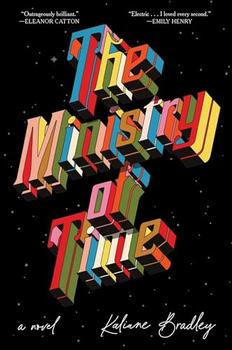Book Club Discussion Questions
Want to participate in our book club? Join BookBrowse and get free books to discuss!
Please be aware that this discussion guide will contain spoilers!
-
Toward the beginning of the book, the bridge declares, "Set your narrative as canon and in a tiny way you have pried your death out of time, as long as the narrative is recalled by someone else." With this in mind, consider the power and also the danger of narrative. Do you believe narrative is used as a weapon at all in this story?
-
At the beginning of the book, Adela tells the bridge that the Ministry prefers to refer to the time-travelers as "expats" rather than "refugees." This is set up in contrast with the experience of the bridge's mother, who was automatically labeled a refugee after leaving Cambodia. What do you think the author is trying to communicate by using the vocabulary of immigration in the context of time-travel? How do the experiences of the expats and the bridge's mother compare, and why might the Ministry be invested in categorizing them differently?
-
In Chapter 5, the bridge, in conversation with Quentin, refers to herself, rather than Graham and his fellow expats, as "the pioneer" and "the experiment." What do you think she means by this, and how does it reflect the way her understanding of the Ministry and its work may be changing?
-
Consider the parallels between the Victorian-era norms Graham espouses and those of the bridge's near-future era (almost identical to our own). Did any of the similarities or differences surprise you?
-
Gore is fascinated by Spotify and loves a hot bath, but rejects television and other modern conveniences. What surprised you most about his encounters with technology? Which elements of modern life would you expect to be most appealing and most off-putting to someone from the Victorian era?
-
Throughout the book, the bridge questions the morality of her intentions and motivations, particularly when it comes to Graham. Imagine you are friends with the bridge and she's asked for your advice on how to most ethically handle her work with Graham and the Ministry. What would you say?
-
Interspersed between regular chapters are short passages set during the Franklin Expedition. How do these passages, the only part of the book not from the perspective of the bridge, alter the way you consider Graham's character and experience?
-
While there are many sources of tension in this story, there also is a wealth of comic relief, from the bridge's chicken bag to Margaret's vocabulary (insults, in particular), to the various ways the expats respond to phenomena of the future (washing machines, Spotify, germs). How did the author's sense of humor influence how you perceived the characters and their situation?
-
Toward the end of the book, we discover that when Graham first met the bridge, he mistook her for the Inuit woman whose husband he had accidentally killed in the Arctic. What do you think the author is trying to do by making this connection between the two women?
-
Having finished the book, do you feel you can identify, with confidence, any characters as explicit heroes or villains?
-
After you finish the book, reconsider the first chapter of The Ministry of Time. Do you understand the characters and plot differently the second time around?
-
How do you interpret the ending of the novel, and what does the future hold for the characters?
-
Throughout the novel, our character is known only as "the bridge." Why do you think the author made that choice?
Unless otherwise stated, this discussion guide is reprinted with the permission of Avid Reader Press. Any page references refer to a USA edition of the book, usually the trade paperback version, and may vary in other editions.
